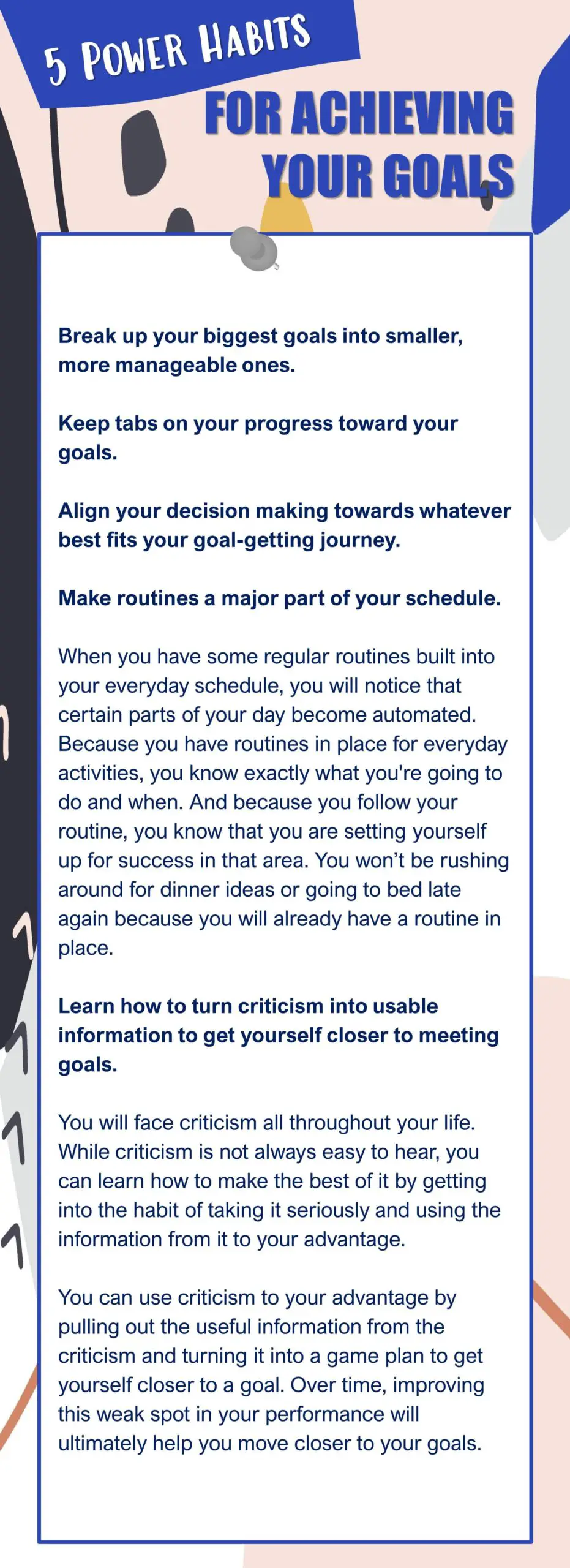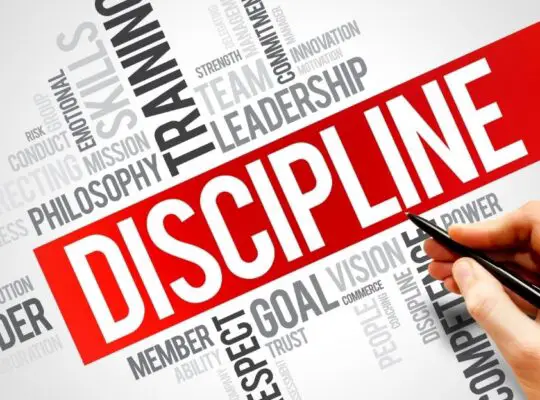#1 Break up your biggest goals into smaller, more manageable ones.
A common mistake people make when chasing after a big goal is trying to achieve everything all at once. Big goals take time to accomplish. Instead of focusing entirely on your ultimate goal, get into the habit of breaking up these big goals into smaller, more manageable ones.
By focusing on smaller goals, you can see yourself moving closer to the goal more easily. Think of the smaller goals as stepping stones towards your ultimate goal. As you meet more and more of these little goals, you move yourself closer to your bigger one.
#2 Keep tabs on your progress toward your goals.
Think about the amount of work you will need to do in order to reach one of your biggest, most ambitious goals. When you think about how long it would take you to reach one of these goals and how much work you will need to do to get yourself there, it may feel incredibly overwhelming and out of reach.
When your goals feel so big and distant that it’s difficult to imagine yourself ever reaching the end of that journey, it is important to have a system for keeping tabs on the progress you’re making towards those big goals.
You can design a system to keep track of your goal-getting progress that makes the most sense for you. For example, some people like to keep track of their progress by writing in a journal every day.
Other people like to keep track of important statistics on tools such as spreadsheets to track the progress they’re making toward their big goals. Some people use social media as a way to track important steps they’re making towards their goals. However you like to keep track, make sure you’re doing it on a regular basis.
Keeping tabs on the progress you’re making towards your goals is a great way to see how you are actually moving forward towards that goal. Even if it feels like you’re moving at a slow pace, looking at all the progress you made in one place is an excellent way to see that you are actually moving forward – even if it is slow going.
#3 Align your decision making towards whatever best fits your goal-getting journey.
A great Habit to help you achieve goals is learning how to align all of your decision making toward whatever best fits your goal getting journey. This may seem like overkill.
You may not believe that every decision you make has the power to impact your overall ability to meet a goal. However, this is far from true. Every time you’re faced with a decision to make, you have the power to make a good choice that can help you move closer to your biggest, most important goals in life.
For example, consider a common and mundane scenario: you can either stay up late and watch more television, or you can go to bed at a reasonable hour and get plenty of sleep before school. You may feel incredibly tempted to stay up and watch a couple more episodes of your favorite TV show.
However, you know that getting a good night’s sleep will benefit your performance at school the next day. As you struggle with this decision, practice weighing both of the choices against her ultimate goal of graduating.
Which of the options is best 4 meeting your ultimate goal of graduating? Using this lens to examine your choices, your best decision is obvious: going to bed on time is going to positively impact your performance in school – staying up late to watch TV, not so much.
#4 Make routines a major part of your schedule.
Having a solid set of routines is another great habit that supports meeting your goals. When you have some regular routines built into your everyday schedule, you will notice that certain parts of your day become automated. With a routine, you don’t have to worry about the mundane parts of life, such as getting ready for bedtime or cooking a nutritious dinner after work.
Because you have routines in place for everyday activities like these, you know exactly what you’re going to do and when. And because you follow your routine, you know that you are setting yourself up for success in that area. You won’t be rushing around for dinner ideas or going to bed late again because you will already have a routine in place.
For example, consider a good bedtime routine. If you have a bedtime routine that you follow every night to prepare yourself for a restful night’s sleep, you know that you are setting yourself up for success the next morning.
When you feel relaxed enough to go to sleep at a reasonable hour, you will get enough rest to feel good and energized the next morning. This routine helps you prepare for bedtime and a way that is predictable and useful for you.
Besides bedtime, you can come up with all sorts of routines for different parts of your day. You can have as many routines as you want. Having routines doesn’t make you boring or predictable; instead, it helps automate certain parts of your day that you know we’re going to happen. This is why I’m getting into the habit of following routines is a great framework for meeting your goals.
#5 Learn how to turn criticism into usable information to get yourself closer to meeting goals.
Learning how to accept criticism is tough. Nobody likes to hear critical thoughts about their decisions, ideas, and actions. However, learning how to accept criticism is a major part of life. You will face criticism all throughout your life.
While criticism is not always easy to hear, you can learn how to make the best of it by getting into the habit of taking it seriously and using the information from it to your advantage.
You can use criticism to your advantage by pulling out the useful information from the criticism and turning it into a game plan to get yourself closer to a goal. For example, pretend you just had your annual review at work.
During the review, your boss criticized your time management skills. Instead of feeling sorry for yourself, you can use this piece of information as a way to determine how you can improve in the future.
Now that you know time management is where you struggle, you can focus on improving it. Over time, improving this weak spot in your performance will ultimately help you move closer to your goals.








